-
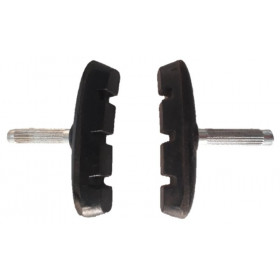 New productBrake pads for V-Brake or cantilever
New productBrake pads for V-Brake or cantilever- €2.99
-
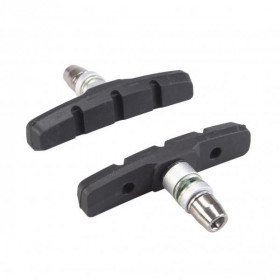 New productBrake pads with screws for v-brake
New productBrake pads with screws for v-brake- €2.99
-
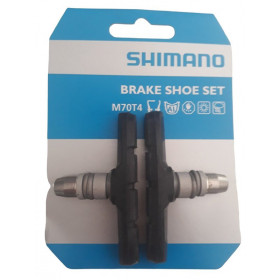 New product -43%Brake shoe set Shimano BR-M530 for v-brake
New product -43%Brake shoe set Shimano BR-M530 for v-brake- €4.55
- €7.99
-
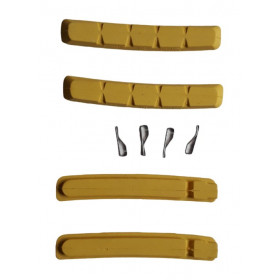 New productSwissstop RX carbon brake pads
New productSwissstop RX carbon brake pads- €19.99
-
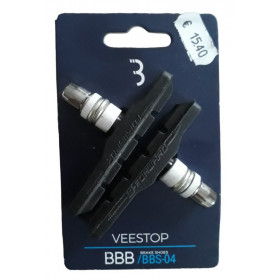 New product -55%Brake shoe set BBB BBS-04 for v-brake
New product -55%Brake shoe set BBB BBS-04 for v-brake- €6.75
- €14.99
-
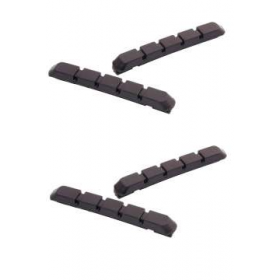 New product4 brake shoes for v-brake XLC 945VC
New product4 brake shoes for v-brake XLC 945VC- €5.95
-
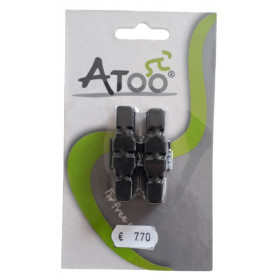 New product -12%Magura HS11 HS33 50mm brake Pads
New product -12%Magura HS11 HS33 50mm brake Pads- €6.78
- €7.70
-
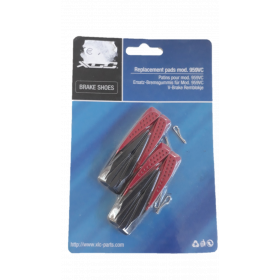 New productBrake shoes XLC 959VC for v brake
New productBrake shoes XLC 959VC for v brake- €7.49
-
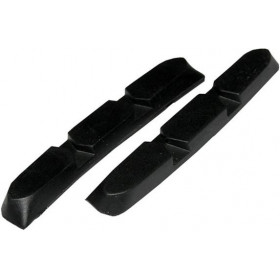 New productV-Brake pad cartridges Jagwire JS90XR
New productV-Brake pad cartridges Jagwire JS90XR- €6.99
Showing 1-9 of 9 item(s)
Everything you need to know about MTB Brake Pads
MTB brake pads play a fundamental role in the safety and performance of your off-road bike. These small components, often neglected, are nevertheless essential to ensure powerful, precise braking adapted to field conditions. This article reviews the characteristics of MTB brakes pads, the leading brands on the market, and gives you advice on choosing them wisely.
What is an MTB brake pad ?
An MTB brake pad is a part made of rubber or composite materials attached to the brake caliper. Its main function is to create friction with the rim (for rim brakes) or the disc (for disc brakes) in order to slow or stop the bicycle.
There are two main types of skates:
For rim brakes: Compatible with V-brake or cantilever systems.For disc brakes: More common on modern mountain bikes, they attach to the calipers and act directly on the disc.
Characteristics of an MTB brake pads
Materials
Organic: Blend of fibers and resin, ideal for quiet and progressive braking.Metallic (sintered): Made of sintered metal, perfect for muddy or wet conditions.
Semi-metallic: A compromise between power and durability, mixing fibers and metal particles.
Compatibility
Make sure the pads are compatible with your braking system (caliper brand and model).Disc brakes require specific pads adapted to the type of disc (steel, aluminum, etc.).
Sustainability
Organic pads wear out more quickly, but are gentler on the discs.Metallic or semi-metallic models offer superior longevity, ideal for demanding practices.
Performance
Organic pads provide powerful braking at low temperatures.Metal models are more resistant to high temperatures during prolonged descents.
The best brands of MTB brake pads
Shimano
Features: Wide range for rim and disc systems.Popular models: Shimano G03S (organic) and Shimano J04C (metallic with cooling fins).
SRAM
Features: Compatible with their Avid and Guide systems.Strong points: Durability and constant braking, even in difficult conditions.
SwissStop
Characteristics: Specialist in high-end pads, particularly for rim brakes.Advantages: Specific mixtures for performance, silence, or wear resistance.
Magura
Features: Ideal for own brand hydraulic disc brakes.Special features: Designed for maximum power and precise modulation.
Jagwire
Features: Economical and efficient options.Specificities: Compatible with many brands and models.
Hope
Characteristics: Suitable for high-end brakes for intense practices (enduro, DH).Strengths: Excellent heat dissipation and reliability.
Kool-Stop
Characteristics: Specialist in rim and disc pads.Advantages: Very good performance in wet conditions.
Tips for choosing your MTB brake pads
Adapt the MTB brale pads to your practice
XC/Trail: Opt for organic models offering progressive braking.Enduro/DH: Choose metallic or semi-metallic skates for their resistance to overheating.
Take climatic conditions into account
In dry weather, organic skates provide optimal power.In the rain or in the mud, metal skates perform better.
Check regularly for wear
Excessively worn pads can damage your discs or rims. Replace them as soon as the thickness is insufficient.Opt for reliable brands
Generic skates can be tempting for their price, but recognized brands guarantee better compatibility and safety.How to maintain your MTB brake pads?
Regularly clean the pads and contact surfaces (rims or discs).
Avoid greasy products on the discs and pads so as not to affect braking.
Change the skates as soon as they show signs of excessive wear or deformation.
Conclusion
MTB brake pads are essential to guarantee efficient and safe braking, whatever your practice. By choosing pads adapted to your braking system, your needs and the terrain conditions, you optimize your performance while increasing the lifespan of your components.
Whether you are a cross-country enthusiast or an enduro enthusiast, brands like Shimano, SRAM or SwissStop offer you reliable and efficient solutions. Take care of your skates and hit the trails with complete confidence !
